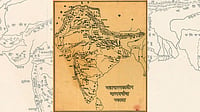The Information Age is essentially an era driven by networks. In the physical realm, it began of course with the laying of railways lines on land and telegraph cables both overland and under the sea in the 19th century. Then, with the coming of electricity, radio, flight, rocketry and finally computers, the 20th century saw the complete saturation of our planet and its surrounding space by networks of unimaginable sophistication and complexity. It never ceases to amaze me that today one is able to stand or sail in the most remote corners of the world and hold in one’s hand a device capable of acquiring information from anywhere on the planet and giving access to nearly the entire sum of accumulated human knowledge. If he were around, William Blake would have managed a wry smile to see us hold infinity in our palm in this fashion. Such is the power and all-pervasiveness of networks in our times. However, to harness the full potential of physical and electronic networks and convert the information into practical wisdom and wealth requires one more crucial ingredient. That crucial capability is provided by human networks.
Today, the creation of wealth and knowledge, the basis of the enduring strength of nations and civilisations in our time, is essentially a collaborative activity. The solitary genius in the mould of a Newton or an Einstein is more or less extinct. The sheer breadth and complexity of our systems across the entire spectrum of human activity require the creation and sustenance of both formal and informal networks of authority and influence. Whether it is government or business, academics or professionals, whether it is the world of sports or the creative arts, networks have become extremely important, to serve as repositories of accumulated wisdom and as crucibles of opportunity.
Given this context, it is more important than ever before that our institutions of higher learning impart not just the core knowledge and skills that provide top-notch competency in a discipline or profession, but that they also provide the paradigm shift of perspective that enables our best and brightest to look beyond their narrow personal goals to appreciate the power and the beauty of human networks and their ability to provide solutions to the enduring and emerging challenges facing the human race. In fact, I would go so far as to suggest that the capability to manage networks is the single-most important quality of a successful manager. A great deal of what many famous achievers have accomplished has been due to the good fortune that their talents have found a supportive environment in the networks they inhabited. Networks multiplied their reach and influence beyond their own native talents. But human networks don’t create and sustain themselves. They require considerable investment of time, resources and, above all, trust. Networks are proof that we are not merely creatures driven by selfish, Darwinian imperatives. The whole is indeed greater than the sum of its individual parts.
In spite of securing admission to the IIMs at Ahmedabad and Calcutta, I never studied business management. Therefore, I have never been part of alumni associations of management schools that form the backbone of some of the most successful networks that operate today. However, the two alumni associations that I can lay claim to—St Stephen’s and the Fletcher School of Law and Diplomacy—have been enriching experiences. As a government minister, I have been gratified to encounter many Stephanian contemporaries in the upper reaches of our bureaucracy. I remember meeting an alumnus from Fletcher after 30 years in a different country. Though we hadn’t met in 30 years, there was an instant connect. These alumni networks help connect with a diverse bunch of individuals, who may later be your mentors, friends or even colleagues.
The alumni association of a college also drives interaction between the current students, faculty and the alumni. Besides, the diverse and deep-rooted knowledge of the alumni can be leveraged to build the capabilities of the institution and so benefit the current students. For me, it is an absolute pleasure interacting with the newer generation of students of my many alma maters. These interactions remind me that our lives can be lived not just as isolated islands, but as hives of creativity and vitality linked by networks. In the era of the World Wide Web, we are all connected, but some connections are closer than others—none closer than those of our alumni networks.
(The author is MoS, HRD ministry)


























